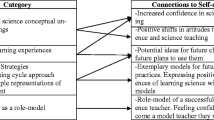Abstract
This pilot study investigated the effect of community-based service learning on the self-efficacy beliefs of preservice elementary teachers in regards to equitable science teaching and learning. Using the Self-Efficacy Beliefs About Equitable Science Teaching (SEBEST) instrument (Ritter, Boone, & Rubba, 2001), pre-and posttest data from 32 preservice elementary teachers who were enrolled in two different science methods courses were analyzed. Findings from this study suggest that community-based service learning significantly influenced preservice elementary teachers’ outcome expectancy toward equitable science teaching and learning.
Similar content being viewed by others
References
Atwater, M. M. (2000). Equity for black Americans in precollege science.Science Education, 84, 154–179.
Bandura, A. (1977). Self-efficacy: Toward a unifying theory of behavioral change.Psychological Review, 84(2), 191–215.
Bandura, A. (1997).Self-efficacy: The exercise of control. New York: W. H. Freeman and Company.
Banks, J. A. (Ed.). (2006).Cultural diversity and education: Foundations, curriculum, and theory (4th ed.), Boston: Allyn & Bacon.
Barton, A. C. (2000). Crafting multicultural science education with preservice teachers through service-learning.Journal of Curriculum Studies, 32(6), 797–820.
Boyle-Baise, M. (2002).Multicultural service learning: Educating teachers in diverse communities. New York: Teachers College Press.
Burstein, N. D., & Cabello, B. (1989). Preparing teachers to work with culturally diverse students: Another educational model.Journal of Teacher Education, 54, 9–16.
Cannon, J. R., & Scharmann, L. C. (1996). Influence of a cooperative early field experience on preservice elementary teachers’ science self-efficacy.Science Education, 80, 419–436.
Czerniak, C., & Chiarelott, L. (1990). Teacher education for effective science instruction: A social cognitive perspective.Journal of Teacher Education, 41(1), 49–58.
Darling-Hammond, L. (1996). What matters most: A competent teacher for every child.Phi Delta Kappan, 78(5), 193–203.
Enochs, L. G., & Riggs, I. M. (1990). Further development of an elementary science teaching efficacy belief instrument: A preservice elementary scale.School Science and Mathematics, 90(8), 694–706.
Eyler, J. S., & Giles, D. E., Jr. (1999).Where’s the learning in service-learning? San Francisco: Jossey-Bass.
Gilbert, A., & Yerrick, R. (2001). Same school, separate worlds: A sociocultural study of identity, resistance, and negotiation in a rural, lower track science classroom.Journal of Research in Science Teaching, 38(5), 574–598.
Irvine, J. J. (2003).Educating teachers for diversity: Seeing with a cultural eye. New York: Teachers College Press.
Koch, J. (2002).Science stories: A science methods book for elementary school teachers (2nd ed.). Boston: Houghton Mifflin Company.
Ladson-Billings, G. (1994). Who will teach our children? Preparing teachers to teach African American learners. In E. Hollings, J. King, & W. Hayman (Eds.),Teaching diverse learners: Formulating a knowledge base for teaching diverse populations (pp. 129–158). Albany: State University of New York Press.
Lumpe, A. T., Haney, J., & Czerniak, C. (2000). Assessing teachers’ beliefs about their science teaching context.Journal of Research in Science Teaching, 37, 123–145.
National Center for Educational Statistics (NCES). (2003).The condition of education 2003. Washington, DC: U.S. Department of Education.
National Research Council (NRC). (1996).National science education standards (NSES). Washington, DC: National Academy Press.
National Science Teachers Association (NSTA). (2003).Standards for science teacher preparation. Washington, DC: Author.
NSTA. (2004).Position statement on science teacher preparation. Arlington, VA: Author.
Pajares, F. (1996). Self beliefs in academic settings.Review of Educational Research, 66, 543–578.
Raudenbush, S., Rowan, B., & Cheong, Y. F. (1992). Contextual effects on the selfperceived efficacy of high school teachers.Sociology of Education, 65, 150–167.
Ritter, J. M., Boone, W. J., & Rubba, P. A. (2001). Development of an instrument to assess prospective elementary teacher self-efficacy beliefs about equitable science teaching and learning.Journal of Science Teacher Education, 12(3), 175–198.
Shultz, E., Nyehart, T., & Reck, U. (1996). Swimming against the tide: A study of prospective teachers’ attitudes regarding cultural diversity and urban teaching.Western Journal of Black Studies, 20(1), 1–7.
Tosun, T. (2000). The beliefs of elementary science teachers toward science and science teaching.School Science and Mathematics, 100(7), 374–379.
Tschannen-Moran, M., Woolfolk Hoy, A., & Hoy, W. K. (1998). Teacher efficacy: Its meaning and measure.Review of Educational Research, 68(2), 202–248.
University Area Community Development Corporation. (2005).Annual report 2005. Retrieved April 27, 2009, from http://uacdconline.org/uacdc/AnnualReport2005.pdf.
Wade, R. C. (1995). Developing active citizens: Community service learning in social studies teacher education.Social Studies, 86(3), 122–128.
Waters, J. J., & Ginns, I. S. (2000). Developing motivation to teach elementary science: Effect of collaborative and authentic learning practices in preservice education.Journal of Science Teacher Education, 11(4), 301–321.
Weiss, I. R. (1997). Comparing teacher views and classroom practice to national standards.National Institute for Science Education Brief, 1(3), 1–11.
Wingfield, M. E., Freeman, L., & Ramsey, J. (2000, April).Science teaching self-efficacy of first year elementary teachers trained in a site based program. Paper presented at the annual meeting of the National Association for Research in Science Teaching, New Orleans, LA. (ERIC Document Reproduction Service No. ED439956)
Author information
Authors and Affiliations
Corresponding author
Rights and permissions
About this article
Cite this article
Cone, N. Preservice elementary teachers’ Self-Efficacy Beliefs About Equitable Science Teaching: Does service learning make a difference?. J Elem Sci Edu 21, 25–34 (2009). https://doi.org/10.1007/BF03173682
Accepted:
Issue Date:
DOI: https://doi.org/10.1007/BF03173682




